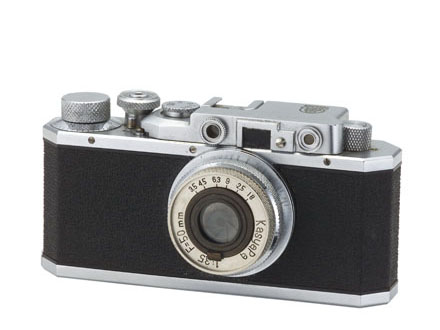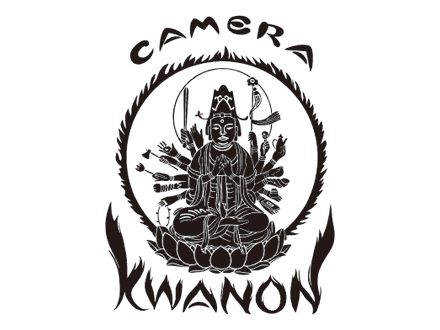News Release
Canon celebrates 80th anniversary of Kwanon, Company's first camera
TOKYO, September 2, 2014—Canon Inc. commemorated today the 80th anniversary of the birth of Japan's first 35mm focal-plane-shutter camera, dubbed the Kwanon, which was produced in prototype form in 1934.

The Kwanon camera prototype

The Kwanon symbol that was engraved into the top of the camera body
The engineers who created the camera decided to name it after Kwannon, the Buddhist goddess of mercy, hoping the deity would share her benevolence as they pursued their dream to produce the world's finest camera. The camera's lens, called Kasyapa—after Mahakasyapa, a disciple of Buddha—also took its name from Buddhism. Additionally, the top portion of the camera body featured an engraving depicting the thousand-armed Kwannon.
In 1936, two years after the birth of the Kwanon and following much trial and error, Canon launched the Hansa Canon,* its first commercial 35mm focal-plane-shutter camera, thus embarking on the Company's history as a camera manufacturer.
In 1959, Canon introduced its first single-lens reflex (SLR) camera, the Canonflex, followed in 1961 by the Canonet, an immensely popular rangefinder camera that took the market by storm, selling out an entire week's worth of inventory in a mere two hours. Following these successes, the Company continued to lead the industry with a range of popular camera models, such as the F-1, a top-of-the-line 35mm SLR camera introduced in 1971, and the AE-1, introduced in 1976, which was the world's first SLR camera equipped with a built-in microcomputer.
In 1987, following continued technological innovation, Canon launched EOS, the world's first AF (autofocus) SLR camera to employ a fully electronic mount system. In 1995, EOS marked its entry into the digital era and the lineup continues evolving today. In 2012, the Company released the Cinema EOS System, a lineup of professional digital cinematography cameras and lenses realized through the culmination of various technological innovations centered on optical technologies developed since the Company's founding. Since its introduction, the Cinema EOS System has contributed to expanding the horizons of visual expression.
Over the 80 years since the birth of the Kwanon camera prototype, Canon, supported by its wide user base, has continuously striven to realize camera and lens technologies to fulfill the Company's never-ending ambition to create the world's finest cameras. Leveraging the technologies and know-how it has acquired over its history, Canon will continue contributing to the development of the photographic and video imaging culture through its technologies and products designed to satisfy the expectations of a wide range of users.
* Made possible through the cooperation of Nippon Kogaku K.K. (present day Nikon Corporation). "Hansa" was the trademark of Omiya Photo Supply, a wholesaler of cameras and photo products. In accordance with a contractual obligation, it was engraved on the top of the camera.
